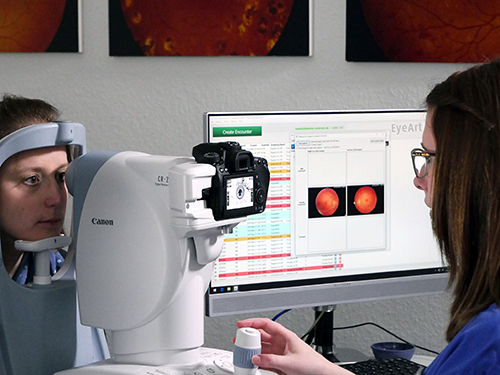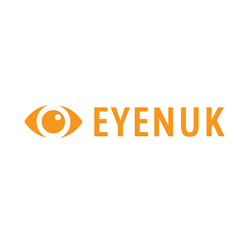
At a routine eye exam, Kaushal Solanki was told an abnormal retinal scan might be a sign of early blindness, and that he needed to see an ophthalmologist fast. But even with superb health insurance, his appointment wait-time was more than four months, time Solanki was worried he couldn’t lose.
Eventually, a photo he sent to a friend ended up in the hands of an ophthalmologist who confirmed Solanki didn’t have early-onset blindness. But the experience left an impression and got him thinking. Could eye diagnoses be streamlined using artificial intelligence (AI) and machine learning technology? In 2010 Solanki founded Eyenuk to make this vision a reality.
The Los Angeles-based company now focuses on one eye disease in particular. “We found that diabetic retinopathy is a huge public health concern,” says Solanki, noting his educated diabetic father wasn’t even aware that the American Diabetes Association recommends regular screenings. The National Eye Institute (NEI) estimates at least two in five American diabetics have some stage of diabetic retinopathy.
Could eye diagnoses be streamlined using artificial intelligence (AI) and machine learning technology?
Funding from both NEI and the National Institute of Biomedical Imaging and Bioengineering through Small Business Innovation Research (SBIR) grants allowed Eyenuk to develop EyeArt, an AI screening system for detecting diabetic retinopathy. The disease is the leading cause of blindness in adults aged 20-74 but in most cases it’s preventable with early detection. Solanki thinks that EyeArt’s automated analysis platform can help increase screening access for diabetics. “No one should lose vision due to a preventable condition.”
Solanki says the NIH small business grants “have been instrumental in the success of the business.” Along with providing funding for EyeArt’s research and development, the NIH’s Commercialization Readiness Pilot Program allowed Eyenuk to run clinical trials validating their technology.

EyeArt has received clearance in Canada, Europe, and the U.S. Solanki says the company is already seeing positive results around the world. The company has recently partnered with the World Diabetes Foundation and the Armenian Eyecare Project to screen every diabetic in Armenian. Several hundred of the 200,000 people screened were diagnosed with eye disease and are now receiving treatment to preserve their vision.
Solanki says diabetic retinopathy is only the beginning and hopes to eventually provide screening for other eye diseases, like macular degeneration. The company is also working on a way to automate image capture with SBIR funding from the National Center for Advancing Translational Sciences. Solanki estimates millions could benefit from their eye screening technology. “Our vision is to screen every eye in the world.”







